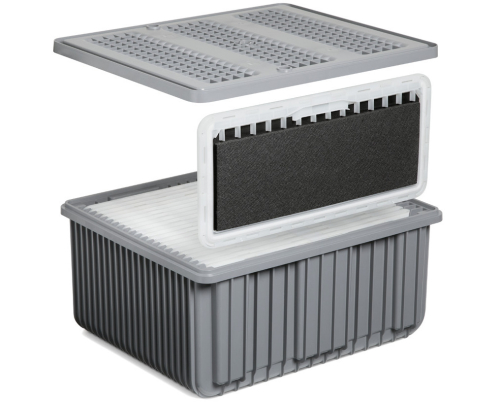Project AMAZE supports Eos' strategy to address increased long-duration energy storage demand driven by the Inflation Reduction Act (IRA) implementation, using its Eos Z3 energy storage system. The project secured an up to $398.6-million conditional commitment for a loan guarantee from the DOE LPO; if the loan is finalized, it would fund 80% of Eos’ planned expansion.

Eos Z3 battery module
Z3 battery modules store electrical energy through zinc deposition. An aqueous electrolyte is held within the individual cells, creating a pool that provides dynamic separation of the electrodes. During charge and discharge, ions move through the electrolyte to their respective electrode to donate or accept electrons, creating a current flow through the bipolar stack.
Conductive plastic anodes (-) and carbon-felt cathodes (+) make up the Z3 electrodes. They’re mechanically tough, corrosion-resistant, and chemically stable, delivering for years with virtually no degradation. The bipolar structure simplifies internal battery connections to reduce internal resistance and improve round-trip efficiency.
A blend of water, halides, additives, and buffering agents make up the proprietary aqueous electrolyte. The formula both enhances zinc solubility and plating and eliminates the dendrite and densification issues that can lead to performance decay and safety hazards.
A rugged, injection-molded thermoplastic polymer exterior provides an optimized structure into which the electrodes are inserted—the Z3 design requires just 20 of them—minimizing materials, manufacturing, and maintenance while eliminating the risk of any external leaking.
In 2018, Eos brought its production and supply chain back to the United States from China, and the expanded facility would further build on Eos’ investment in American manufacturing with the increased production of its zinc-based energy storage systems.
The issuance of conditional commitment by the DOE was preceded by legal, technical and commercial due diligence by the LPO to evaluate the loan and the project’s potential to meet market demand and commercial and environmental benchmarks. While this conditional commitment demonstrates the Department’s intent to finance the project, several steps remain for the project to reach critical milestones, and certain technical, legal and financial conditions must be satisfied and diligenced to the satisfaction of DOE before the Department enters into definitive financing documents and funds the loan.
The Eos Z3 battery contains predominately American components and is specifically designed for mass production and meeting low-cost, long-duration, grid-scale stationary energy storage needs. Domestic production better positions Eos to access the 45X advanced manufacturing direct pay tax credits available under the IRA.
The Eos Z3 battery is based on Eos’ 15-year history of developing the Znyth battery technology, which uses earth-abundant raw materials in its manufacturing and is intended to overcome many limitations in other stationary energy storage solutions.
Eos believes that the secular shift in the energy mix requires an accelerated implementation of its capacity expansion plan to meet the increased demand for Eos Z3 technology that is currently in semi-automated commercial production. Eos announced last week the selection of ACRO Automation Systems to partner in the design, development and implementation of up to four state-of-the-art high output manufacturing lines. ACRO is a recognized leader in high-speed, custom-designed automated manufacturing systems.